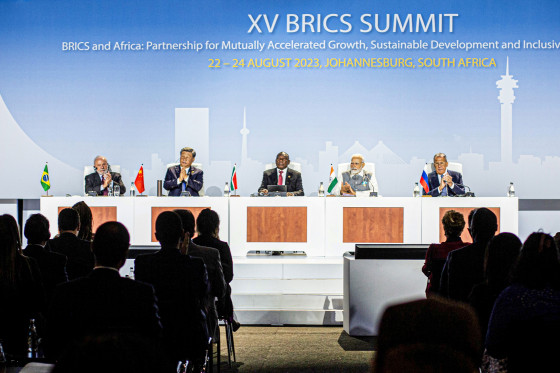
In a TruthSocial postPresident-elect Donald Trump declared on Saturday that if the BRICS geopolitical alliance of non-Western nations stopped utilizing the U.S. dollar for trade, he would levy a 100% tariff on them.
Trump said that the notion that the BRICS nations are attempting to abandon the dollar while we look on is OVER. We demand that these nations promise not to invent a new BRICS currency or support any other currency as a substitute for the strong U.S. dollar. If they do, they will be subject to 100% tariffs and will likely have to bid farewell to selling into the fantastic U.S. economy.
Go find someone else who is a sucker! The president-elect went on to say that there is no possibility that the BRICS would ever completely replace the US dollar in international trade and that any nation that attempts to do so should bid America farewell.
Brazil, Russia, India, and China joined the informal group to establish the BRICS alliance, which is a coalition of non-Western nations that met for the inaugural BRIC summit in 2009. A year later, South Africa joined, solidifying the BRICS moniker.
Egypt, Ethiopia, Iran, Saudi Arabia, and the United Arab Emirates joined the organization at a 2023 conference, marking the group’s first expansion in well than ten years.
De-dollarization, or lessening the impact of the US dollar in international trade, gained momentum at the same summit, even though it is not a novel concept for the organization.
Due to internal strife among the members and significant disparities in how the nations manage their economies and financial institutions, experts are doubtful that BRICS would be able to establish its own currency for international trade.
Nonetheless, China and India are two of the BRICS countries that rank among the United States’ top commercial partners.
An estimated $758.4 billion was traded in goods and services between the United States and China in 2022, and an estimated $191.8 billion was traded in goods and services between the United States and India in the same year, according to the Office of the U.S. Trade Representative.
Requests for response were not immediately answered by representatives of the BRICS nations’ embassies in the United States.
Trump has threatened to increase tariffs on foreign countries twice this week.
The president-elect announced his intention to apply a 25% tariff on goods imported from Canada and Mexico in a post on TruthSocial on Monday. He maintained that the tax was intended to address the fentanyl problem.
He wrote, “I have had many talks with China about the massive amounts of drugs, in particular Fentanyl, being sent into the United States, but to no avail,” threatening to impose a 10% tariff on China. We will impose an extra 10% tariff on all of China’s numerous items entering the United States of America, on top of any other tariffs, until they cease.
Canadian Prime Minister Justin Trudeau visited Trump at his Mar-a-Lago property in West Palm Beach on Friday.
In a different social media post on Saturday, Trump described their discussion as “very productive.”
The United States will no longer stand by and watch as our citizens fall prey to the scourge of this drug epidemic, which is mostly the result of the drug cartels and the influx of fentanyl from China, Trump continued. Too much suffering and death! Prime Minister Trudeau has pledged to join us in putting an end to this horrific destruction of American families.
Mexican President Claudia Sheinbaum wrote to Trump on Tuesday saying tariffs and threats are insufficient to address immigration and drug use in the United States.
To address these important issues, collaboration and understanding amongst parties are required. Until we jeopardize our joint businesses, there will be a corresponding response to each tariff, she continued.
During their phone chat on Wednesday, Sheinbaum said that there was debate around whether or not she had agreed to halt immigration from Mexico into the United States, as Trump claimed she had.
“I explained to him the comprehensive strategy that Mexico has followed to address the migration phenomenon, respecting human rights,” Sheinbaum wrote on X in her own remembrance of the conversation. We reiterate that Mexico s position is not to close borders but instead build bridges between government and people.
Note: Every piece of content is rigorously reviewed by our team of experienced writers and editors to ensure its accuracy. Our writers use credible sources and adhere to strict fact-checking protocols to verify all claims and data before publication. If an error is identified, we promptly correct it and strive for transparency in all updates, feel free to reach out to us via email. We appreciate your trust and support!
